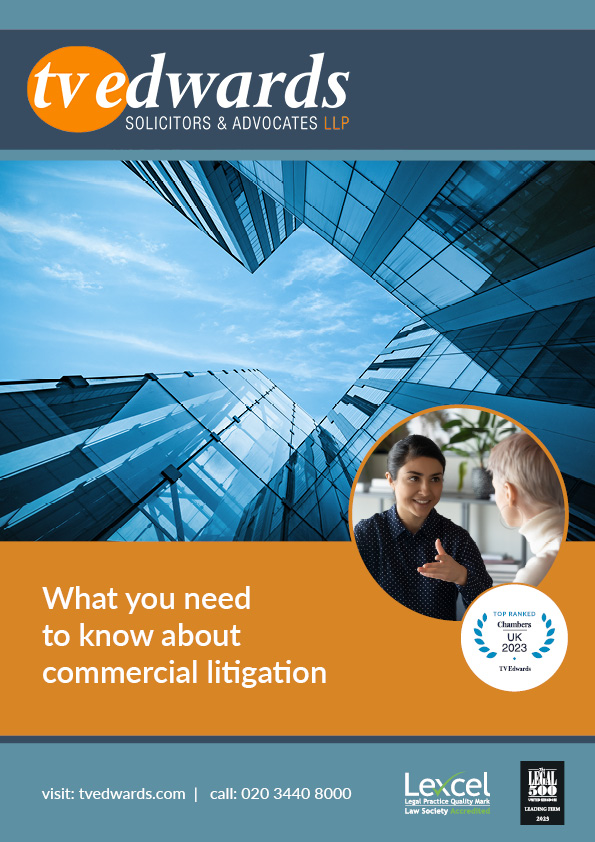Our team of experienced civil litigation solicitors can help you every step of the way.

What Is Civil Litigation?
Civil Litigation is the process whereby one private party brings a claim against another private party before a court.
It is a legal way to resolve civil (non-criminal and non-commercial) disputes.
Often, the party bringing the claim will seek monetary compensation from the other party.
Examples of civil disputes include:
- Breach of contract
- Debt recovery
- Property disputes
- Neighbour disputes
- Intellectual Property disputes
How Does Civil Litigation Work?
In England and Wales, court procedure for civil disputes is governed by the Civil Procedure Rules 1998 (CPR). The basic steps of Civil Litigation are set out below:
Pre-action protocols
Before bringing a claim, parties should seek to resolve the issue by exchanging information regarding their positions. Court proceedings should only be used as a last resort.
Pleadings
If the dispute is not resolved after the pre-action protocols, the claim will then proceed to court.
The person bringing the claim (the ‘Claimant’) must complete a claim form and serve it on the other party in the dispute (the ‘Defendant’).
The claim form will be accompanied by the Particulars of Claim, which will set out:
- The facts giving rise to the claim
- The legal basis of the claim
- The remedy sought by the Claimant, which is usually monetary compensation
The Defendant must respond with one of the following:
- An Admission, if it wishes to admit that the claim against them is true. At this stage, the claim would come to an end and the Claimant can enter judgment.
- A Defence, if it wishes to defend the claim against them.
- An Acknowledgment of service, if it wishes to defend the claim but hasn’t yet been able to file its defence.
The Particulars of Claim and the Defence are known collectively as ‘pleadings’. They are usually drafted by a party’s legal representatives.
Costs And Case Management Conference (CMC)
Once the Defence is filed, the Court will actively begin managing the case. The Court will start by allocating the claim to the correct ‘track’, depending on the complexity of the dispute and the monetary value of the claim.
The claim will be allocated to one of three tracks:
- Small claims track – for claims valued below £10,000
- Fast track – for claims valued between £10,000 and £25,000
- Multi-track – for claims valued over £25,000
The two main courts that deal with civil cases in England and Wales are the County Court and the High Court.
After the claim has been allocated, the CMC will take place. This is an administrative hearing where the Court will set out the next steps that the parties need to take and the deadlines for doing so.
The Court will also consider the cost management of the case, i.e. how much the parties are planning to spend on legal costs in order to bring the matter to trial.
Disclosure
This refers to the process whereby parties make available to each other the documents they have that are relevant to the case. For a more detailed explanation of Disclosure, please read our blog post.
Witness Statements and Expert Evidence
Following disclosure, the parties may exchange witness statements. These may be necessary to supplement the documents provided by the parties. A witness statement sets out in writing factual evidence from a witness.
Some cases may require expert evidence. This would be necessary in cases where technical knowledge regarding the case is required by the Court.
An ‘expert’ is a highly skilled or knowledgeable individual who can provide impartial advice on matters within their expertise. This will usually take the form of a written report.
Pre-Trial Review (PTR)
This is an administrative hearing where the Court will: ensure that the parties have complied with the procedure timetable and any court orders; fix a trial date; and finalise the timetable for the trial and the list of issues to be decided on at trial.
Trial
If the matter has still not been settled, it will proceed to trial. The trial will determine the outcome of the litigation, i.e. whether the claims succeeds or fails.
Parties will usually instruct barristers to present their case in court. Witnesses and experts may also give their evidence during the trial.
The Court will then make a judgment on liability and determine the amount of damages to be awarded. The Court will also consider which party should pay the cost of the proceedings.
Enforcement
If the party who has been awarded damages and/or costs does not receive payment from the other party within the set timeframe, it can ask the court to enforce the judgment.
How Can Our Civil Litigation Solicitors Help You?
Our civil litigation solicitors can help every step of the way, whether you are bringing or defending a claim in a civil dispute. We can assist you both before and during the court procedure.
Before going to court, we can assist by:
- Evaluating the strength of your claim (or defence), the options available to you, and the likely outcomes of each
- Ensuring that you understand all the costs involved in bringing a claim
- Liaising with the other party in the dispute
- Gathering evidence to support your case
- Helping you to resolve the matter before going to court
If the matter goes to court, we can assist by:
- Initiating court proceedings on your behalf
- Corresponding with the Court and the other party
- Guiding you through each step of the court procedure
- Drafting pleadings
- Helping to prepare witness statements
- Instructing counsel on your behalf
- And much more.
If you are seeking a solicitor to advise you or would generally like to find out more about our services, please contact our Dispute Resolution team at TV Edwards.

 You & Your Family
You & Your Family You & Your Property
You & Your Property You & Your Business
You & Your Business







